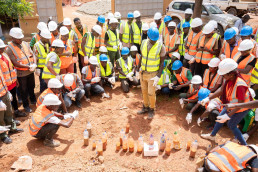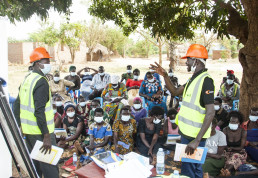OUR IMPACT

Transforming artisanal mining, changing lives
Since 2015, our Programme has significantly advanced the artisanal and small-scale mining (ASM) sector in African, Caribbean and Pacific countries by creating an enabling environment for artisanal and small-scale miners and strengthening the capacities of miners and public institutions. The Programme has fostered growth and sustainability in the artisanal and small-scale mining sector, with a strong focus on inclusivity, environmental responsibility, and economic empowerment. It has also promoted innovation and value addition. Key highlights include:
Organization and formalization of artisanal mining: Our Programme conducted extensive campaigns, trainings and capacity building events to support artisanal and small-scale miners in organization, improved governance of ASM cooperatives, as well as registration and legal formalization of ASM. At least four hundred ASM cooperatives and enterprises with 21,000+ miners formalized in Burkina Faso, Cameroon, Guinea, Congo Republic, Tanzania, Uganda, and Zambia, 200+ government officials (40 percent women) trained as trainers.
Knowledge exchange: Organized and facilitated 220 events on policy advocacy, engaging over 29,000 participants and sharing best practices. The Programme fostered knowledge exchange between African, Caribbean, and Pacific countries, facilitating the sharing of best practices and lessons learned in mineral regulation, digitalization, and ASM governance.
Women’s empowerment: Implemented targeted initiatives to empower women miners and cooperatives, enhancing their leadership roles and participation in the mining sector. Overall, women form 40% of the Programme beneficiaries.
Business development and value addition: Improved access to markets for ASM through training, small grants, and participation in business fairs, benefiting over 20,000 people. The Programme promoted skills development for value addition to Development Minerals and enhancement and production of low-carbon, circular and greener materials.
-
- Put Development Minerals “on the map”
- Raised the profile of artisanal and small-scale mining
- Helped organize and formalize artisanal miners and build their capacities
- Fostered enabling environment and improved capacity of government institutions working with artisanal miners
- Empowered women in mining
- Provided small grants to artisanal mining organizations to foster better health, safety and environmental management
- Facilitated knowledge exchange between and within countries
- Fostered transformation of artisanal mining as business organizations
- Supported innovative, environmentally-friendly technologies for value addition and job creation
AT A GLANCE
400+
artisanal and small-scale mining cooperatives formalized with
21000+
members
14000+
40%
of beneficiaries are women
OUR ACHIEVEMENTS

The Programme supported countries to create a more enabling environment for artisanal and small-scale miners of Development Minerals and strengthen the capacities of artisanal miners and public institutions. It contributed to policies, strategies, laws and actions on strengthening the Development Minerals sector in programme countries.
40+
ACP countries benefitted from the Programme
10
Countries received direct support
Formalization and business acceleration strategies developed in Uganda, Zambia, Cameroon and Guinea, which informed the African continental strategy on ASM
Paved the way for the historic Mosi-Oa Tunya Declaration reaffirming the rights of Artisanal and Small-Scale miners
CAPACITY DEVELOPMENT
The Programme organized extensive country-level and regional training for artisanal miners and public officials. These included training of trainers and resource people to further amplify the reach of the training.
350+ trainings delivered
14 000+ people trained
Trainings in:
-
- Administration and governance of ASM
- Health and safety in ASM
- Mine and quarry management
- Business and finance
- Environmental and social practices in ASM
- Value-addition - production of low-carbon materials
300+ trainings delivered
20 000+ people trained
Trainings in:
-
- Administration and governance of ASM
- Health and safety in ASM
- Mine and quarry management
- Business and finance
- Environmental and social practices in ASM
- Value-addition and promotion of low-carbon materials
KNOWLEDGE EXCHANGE
The Programme organized extensive knowledge exchange events at global, regional and country levels on:
-
- Advocating for policy changes on artisanal and small-scale mining
- Sharing lessons learned and good practices
- Enabling country-to-country exchanges
- Raising awareness about low-carbon building materials−produced by value-addition to Development Minerals
220+
knowledge sharing and South-South Cooperation events
29 000+
participants
EVIDENCE BASE
To fill the gaps in information about the Development Minerals sector and improve transparency, the Programme carried out assessments, training and introduced digital tools.
-
- Baseline studies and censuses on Development Minerals in ACP Countries
- Mapping Development Minerals deposits, estimating reserves for sustainable sourcing
- Training young geologists
- Environmental assessments and studies
- Formalization and business acceleration assessments
Baseline studies and censuses on Development Minerals in
10 ACP countries
ORGANIZATION AND FORMALIZATION OF ARTISANAL MINING
The Programme worked extensively with artisanal and small-scale miners. It worked with governments to improve or create systems of formalization of ASM and provide extension services to artisanal miners.
400+
artisanal and small-scale mining cooperatives formalized with
21 000+
members in Burkina Faso, Cameroon, Congo Republic, Guinea, Uganda, Tanzania and Zambia
250+
government officials (40% women) trained as trainers to provide extension services to ASM
ENVIRONMENTAL, SOCIAL, GOVERNANCE AND SAFETY PRACTICES
The Programme provides training on and promotes practices for better health, safety and environmental management practices, and social cohesion in artisanal and small-scale mining communities. It brings laws and regulations to the field, helping better implementation of laws in practice
-
- Conducted assessments on the environmental impact of artisanal, small-scale mining and quarrying
- Developed an ASM-friendly environmental management toolkit
- Developed toolkits to improve miners’ practices on safety, health and environmental management
- Organized practical initiatives on land restoration and improved environmental practices
- Supported extension services by local governments and mining authorities to artisanal and small-scale miners
- Developed a digital tool for early warning of environmental and social problems of mining and quarrying
WOMEN’S EMPOWERMENT
The Programme implements targeted initiatives to support women artisanal miners and women’s mining cooperatives, enhance their leadership skills and standing. It also has extensive reach to women through inclusive training and capacity building programmes.
of our beneficiaries are women
of training participants are women
have improved working conditions for women
have women in leadership positions
From the results of 2022 survey of ASM cooperatives and enterprises supported by the Programme
DIGITAL INNOVATION
Developed digital tools to improve the governance of ASM:
-
- Mining cadastre
- Illegal mining monitoring tool
- Digial library of geodata
- Cost of production app for small businesses in mining and quarrying
- Digital market apps
- Conflict management app for early warning
BUSINESS DEVELOPMENT
Through skills training, events and small grants, the Programme helped improve the businesses and incomes of artisanal and small-scale mining and value-addition.
-
- Over 20,000 people in artisanal and small-scale mining and artisans’ communities benefitted directly and indirectly from small grants to improve productivity and incomes, and implement initiatives to improve environmental management
- Supported participation of artisanal businesses and SMEs in product and business fairs in Cameroon, Zambia, Uganda and Jamaica to improve access to markets
- Supported women-run associations with small grants to increase their production and sell products at the regional level
- Implemented trainings for women and youth employment initiatives in Uganda and Cameroon
- Implementing small business development initiativesto promote transformation of artisanal and small-scale mining cooperatives into businesses, building their capacities to supply to large-scale, formal sector enterprises
LOW-CARBON MATERIALS PROMOTION
The Programme implements innovative initiatives to support countries in business and value chain development, and value-addition to Development Minerals to produce low-carbon, circular materials and skills development for youth.
Research
and knowledge sharing sessions
to raise knowledge and awareness about low-carbon, circular and environmentally-friendly uses of minerals at global and regional fora
Practical trainings in value addition to Development Minerals
in eco-bricks production – to create jobs for youth, refugees and host populations
Explored and tested productivity enhancing, affordable technologies
for artisanal and small-scale mining enterprises
Sustainable sourcing and pilot production initiatives
for low-carbon building materials, connecting research with business
